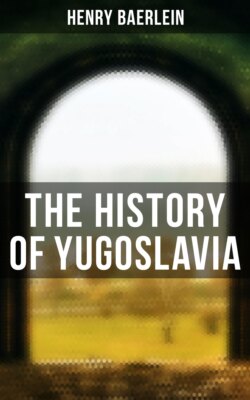Читать книгу The History of Yugoslavia - Henry Baerlein - Страница 14
На сайте Литреса книга снята с продажи.
SIMEON THE BULGAR
Оглавление"Frequent assaults" is probably a correct description of what the Serb of that period had to endure at the hands of this particular opponent, the Bulgar. Having swarmed across the Peninsula, the Bulgar was now in the act of consolidating a great kingdom, for this was the magnificent epoch of the Bulgarian Tzar Simeon, whose word ran far and wide from the Adriatic. The Bulgarian map[9] which exhibits the Tzardom at the death of Simeon is painted in the same brown colour from opposite Corfu right across to the Black Sea and up as far as the mouths of the Danube, which signifies that in those parts (including, of course, Macedonia) the word of Simeon was supreme. But the Serbian provinces of Raška, Zeta, Bosnia and some adjoining lands are painted brown and white, being hatched with white diagonal lines; and this indicates very candidly that in the north-west Simeon was not omnipotent. We are indeed told in the letterpress that "on the other hand Simeon meanwhile took the opportunity to settle accounts with the Serbians because of their perfidious policy, and he subjected them in the year 924"; but doubtless this was a kind of subjection which in 925 would have to be repeated, and this would account for one of Simeon's faithful chroniclers having made that allusion to perfidious policy. Of the Tzar himself we are given an attractive picture: unlike his father, Boris, who patronized Slav literature for the reason that it made his State less permeable to Byzantine influence, Simeon had no political object in his encouragement of native literature.[10] He was himself a man of letters, having studied at Constantinople. He was acquainted with Aristotle and Demosthenes, he discussed theology with the most eminent doctors of the Church, and of positive science—or of what was then regarded as such—he possessed everything which had survived the great shipwreck of ancient thought. Not only did he found monasteries and schools, but he gathered writers round him; and, in order to stimulate them, he himself wrote original books and translations, thus ennobling, we are told, the literary vocation in the eyes of his rude and warlike race. He would probably have smiled if he had known that one of his writers had attributed to him the subjection of the Serbs; but what one would like to learn is whether Macedonia, even then a kaleidoscope of races, was more or less completely under the shadow and the brilliance of his sword, more or less completely subjugated. Four centuries later the Serbs were to have a Macedonian empire which, like Simeon's, dissolved on the death of its founder. To these old empires the Serb and the Bulgar of our day are looking back, and it would be interesting to know if harassed Macedonia was calmly content to be first Bulgarian and then Serbian, or whether it was a calm of that Eastern kind which means that a ruler's assaults upon the people are infrequent.
